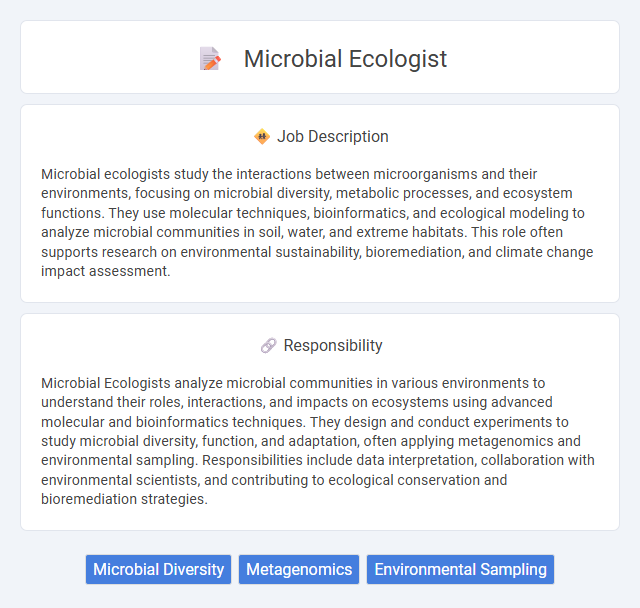
Microbial ecologists study the interactions between microorganisms and their environments, focusing on microbial diversity, metabolic processes, and ecosystem functions. They use molecular techniques, bioinformatics, and ecological modeling to analyze microbial communities in soil, water, and extreme habitats. This role often supports research on environmental sustainability, bioremediation, and climate change impact assessment.
Individuals with a strong curiosity about microorganisms and ecosystems are likely to find a career as a microbial ecologist suitable. Those comfortable with fieldwork, laboratory experiments, and data analysis may have a higher probability of success in this role. Candidates who possess patience, attention to detail, and enjoy working both independently and collaboratively will probably adapt well to the demands of this profession.
Qualification
A Microbial Ecologist typically requires a master's or doctoral degree in microbiology, ecology, or environmental science, emphasizing microbial communities and their interactions with ecosystems. Extensive experience in molecular techniques, bioinformatics, and environmental sampling is crucial for analyzing microbial diversity and function in various habitats. Proficiency in data analysis software and a strong foundation in environmental microbiology principles are essential for interpreting complex ecological data and contributing to research or conservation projects.
Responsibility
Microbial Ecologists analyze microbial communities in various environments to understand their roles, interactions, and impacts on ecosystems using advanced molecular and bioinformatics techniques. They design and conduct experiments to study microbial diversity, function, and adaptation, often applying metagenomics and environmental sampling. Responsibilities include data interpretation, collaboration with environmental scientists, and contributing to ecological conservation and bioremediation strategies.
Benefit
Microbial ecologists likely gain valuable insights into microbial interactions and ecosystem functions, which can enhance environmental conservation efforts. Their expertise may lead to advancements in biotechnology and sustainable agriculture, improving resource management. This role probably offers opportunities for impactful research that supports biodiversity and public health initiatives.
Challenge
Microbial ecologist roles likely involve complex challenges related to studying microbial interactions within diverse ecosystems where data variability and environmental factors are difficult to control. The probability of encountering obstacles in isolating specific microbial impacts on soil, water, or host organisms is high due to intricate biological networks. Managing and interpreting vast, often incomplete datasets might also pose ongoing difficulties requiring advanced analytical skills.
Career Advancement
Microbial Ecologists specializing in environmental microbiology can advance their careers by pursuing advanced degrees, such as a Ph.D., and gaining expertise in bioinformatics and molecular techniques. Leadership roles often involve managing research projects, securing grants, and collaborating with interdisciplinary teams to address ecosystem health and bioremediation challenges. Professionals may also transition into policy advisory positions or academia, contributing to scientific knowledge and environmental sustainability initiatives.
Key Terms
Microbial Diversity
Microbial ecologists specializing in microbial diversity analyze complex communities of microorganisms in various environments to understand their roles in ecosystem functioning. They apply advanced molecular techniques such as metagenomics and 16S rRNA gene sequencing to identify and characterize microbial species diversity and distribution patterns. Their research supports biodiversity conservation, bioremediation efforts, and the development of sustainable agricultural practices through enhanced microbial ecosystem services.
Metagenomics
Microbial ecologists specializing in metagenomics analyze complex microbial communities by sequencing environmental DNA to uncover biodiversity and functional potential. They utilize high-throughput sequencing technologies and bioinformatics tools to interpret metagenomic data, revealing microbial interactions and ecosystem dynamics. Expertise in computational biology and microbial ecology is essential for advancing research in environmental health, biogeochemical cycles, and biotechnology applications.
Environmental Sampling
Microbial ecologists specializing in environmental sampling design and implement protocols to collect soil, water, and air samples for microbial analysis, ensuring the accurate representation of microbial communities in diverse ecosystems. Expertise in aseptic techniques and advanced molecular tools, such as DNA sequencing and metagenomics, enables the identification and quantification of microbial populations critical for assessing ecosystem health and biogeochemical processes. These specialists interpret environmental data to monitor pollution impacts, track microbial biodiversity, and support conservation efforts through informed ecological modeling.
 kuljobs.com
kuljobs.com